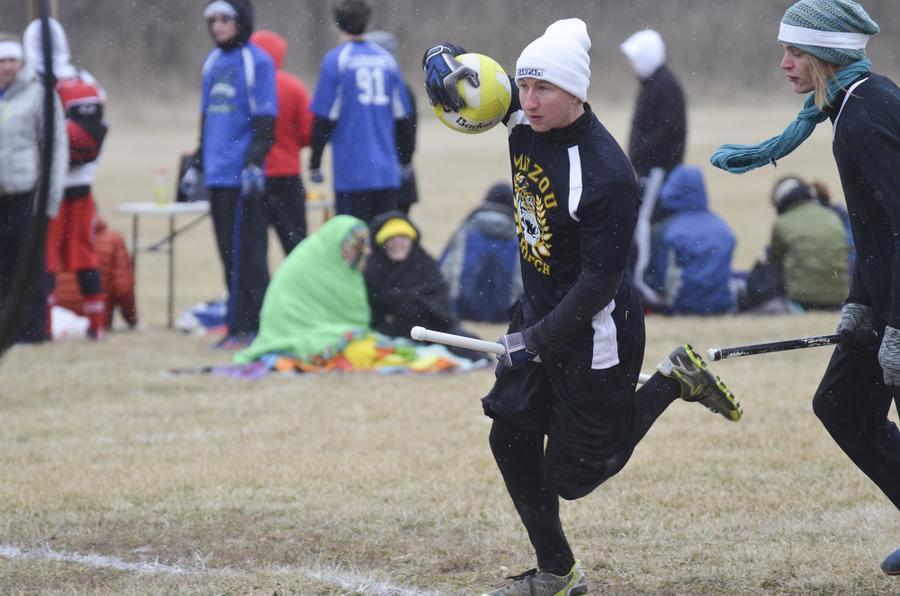
All eyes are trained on the ball as it soars through the air. Players block each other as they try to catch it. Passing students turn to stare at the PVC pipes between the players’ legs, but the players are all oblivious. The ball zips through one of three rings, and half the players cheer.
MU’s Club Quidditch is for real.
Quidditch is a co-ed, full-contact sport from the popular “Harry Potter” series by J.K. Rowling. The sport started in 2005, when a college in Vermont first invented the gameplay for Muggles, or non-magical humans.
MU’s team, which currently comprises 23 students, has been running for a little more than four years. They have been training harder than Hermione Granger studied for the Ordinary Wizarding Level Examinations, in preparation for the U.S. Quidditch World Cup 8 April 11 and 12 in Rock Hill, South Carolina.
They are like any other sports team — dedicated, competitive and united on and off the field. The only differences are the unorthodox origins of the game and the fact that these players have two passions in common instead of one: sports and “Harry Potter.”
The first World Cup tournament saw only seven teams. Today, according to the U.S. Quidditch website, 80 teams compete for the World Cup. The live stream of the final match garners about 8,000 views.
The game incorporates elements of rugby, dodgeball, basketball, soccer and wrestling, according to the [Mizzou Club Quidditch website.](http://www.mizzourec.com/programs/sports-competition/club-sports/quidditch/)
Each team consists of seven players. Players must have a regulation broomstick between their legs at all times during official matches. The goal of the game is to score as many points as possible.
Teams score points when their three chasers throw the quaffle (a volleyball) through one of three hoops, which is guarded by a keeper. Two beaters try to stop chasers by using bludgers (dodgeballs). If a player is hit by a bludger, they are out of play until they touch their own goalposts.
The game ends when a team’s seeker catches the snitch (a ball attached to a snitch runner), which is only released 18 minutes into a game.
Sophomore Jonathan Quattlebaum is the vice president of the team and plays as a chaser. He said he enjoys playing Quidditch because it is inclusive.
“Everybody’s on the same plane,” Quattlebaum said. “It’s how well you can play and what you can do for the team. It’s so inclusive that everybody can play … It just comes down to what you’re willing to put in and what you’ll get out of it.”
Freshman Gabrielle Pollard, another chaser, said the team is balanced.
“What I notice is that there’s a limitation on females versus males, even if it is co-ed, but this one, like Jon said, is a level playing field, so everyone has a fair chance and it just feels like what I put into it is worth it in the long run, and so that’s a really good feeling,” Pollard said.
The Quidditch team spends long periods of time together both in and out of training. They often eat together, have game nights or tease each other about which house other teammates belong to, a reference to the four houses of the wizarding school Hogwarts.
“Tim Leible (a member in charge of utilities) is a Hufflepuff,” Quattlebaum said, evoking laughter and agreement. “He’s in denial.”
Since Quidditch is a full-contact sport, the team has seen their share of injuries, ranging from regularly bruised legs to concussions. Senior Josh Ebbesmeyer, the president of the club and a keeper on the team, suffered a concussion several years ago, and another player has broken a tooth.
“We don’t have a lot of injuries, and if we do, they’re usually pretty minor,” Ebbesmeyer said. “Everybody comes out of every tournament, if they played, feeling beaten up with all the bruises and the soreness and everything following a weekend of playing a full-contact sport. But for the most part, we’ve avoided major injuries this year.”
Pollard said she joined Quidditch because it combined two things that she liked: Harry Potter and athletics. She said that it was these two factors that drew members to the Quidditch team, but that “they stay for the friendship and they stay for the fun of it.”
Members said they found out about the Quidditch team through friends or during their freshman orientation.
“All of us are such close friends,” Pollard said. “We hang out as much as possible. Quidditch has taken over my life, and it’s definitely an amazing thing, and I don’t regret it, because I have all of the best friends that I could ask for and countless experiences that I wouldn’t change for my freshman year.”
Both Pollard and Quattlebaum joined the team in the fall.
“This was within a month and a half of me joining the team, but I remember tweeting, ‘Joining the Quidditch team is by far the best decision I’ve made at Mizzou,’ and I completely stand by that statement,” Quattlebaum said. “It’s completely engulfed my life and everything that I do … It is just such a great feeling being part of a family like this.”